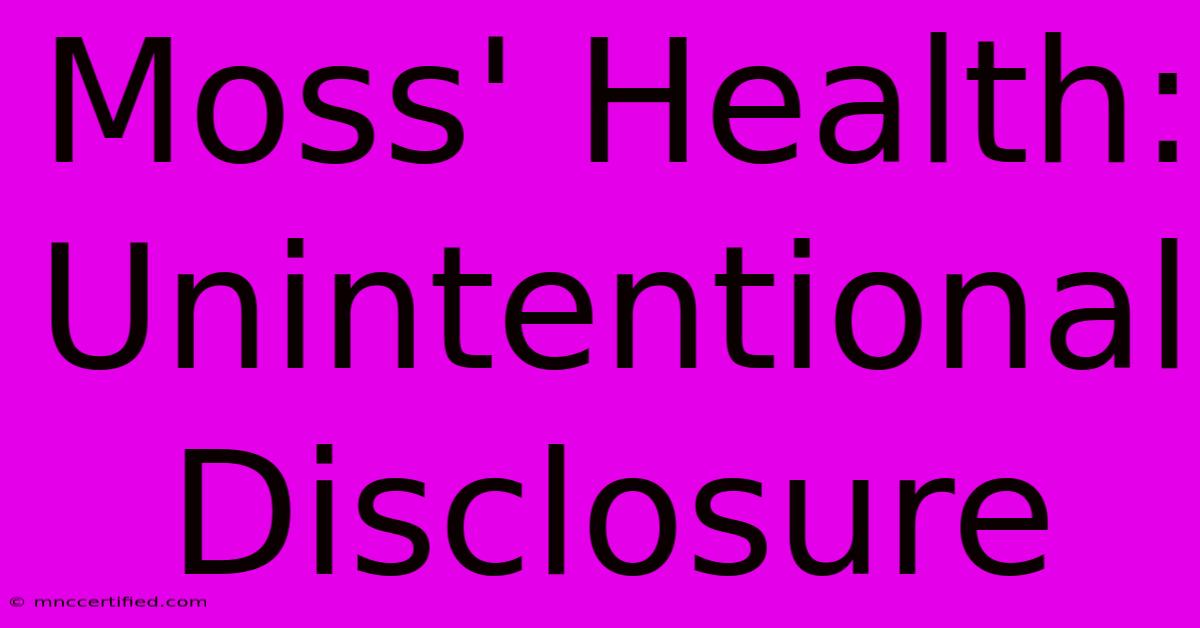Moss' Health: Unintentional Disclosure

Table of Contents
Moss' Health: Unintentional Disclosure – Navigating Privacy and Public Perception
The unintentional disclosure of an individual's health information, particularly when that individual is a public figure, raises complex legal and ethical questions. This article explores the ramifications of such disclosures, focusing on the implications for both the individual whose health is revealed and the party responsible for the leak. We will examine the legal landscape, ethical considerations, and strategies for managing the fallout of an unintentional disclosure, using the hypothetical case of "Moss" as a focal point.
Understanding Unintentional Disclosure in the Context of Health Information
Unintentional disclosure of health information, also known as a breach of privacy, can occur in various ways. It might involve:
- Accidental release of medical records: A simple error, like sending an email to the wrong recipient or leaving medical files unsecured, can have far-reaching consequences.
- Social media posts: A seemingly innocuous comment or photo shared on social media can unintentionally reveal sensitive health details.
- Conversations overheard: Confidential conversations about someone's health, even in private settings, could be overheard and spread.
- Data breaches: Large-scale data breaches impacting healthcare providers can expose the health information of thousands of individuals.
In the case of a public figure like "Moss," the consequences of unintentional disclosure are amplified. The information is more likely to be disseminated widely, potentially impacting their career, reputation, and personal life.
The Legal Ramifications for "Moss"
Depending on the jurisdiction and specifics of the disclosure, "Moss" may have legal recourse. Laws like HIPAA in the United States protect the privacy of health information. Breaches can lead to legal action against the party responsible for the disclosure, potentially resulting in:
- Civil lawsuits: "Moss" could sue for damages related to emotional distress, reputational harm, and financial losses.
- Criminal charges: In certain circumstances, depending on the intent and severity of the breach, criminal charges could be filed.
The success of any legal action depends on proving negligence or intentional wrongdoing on the part of the individual or entity responsible for the disclosure.
Ethical Considerations and Public Perception
Beyond the legal ramifications, the ethical implications of unintentionally disclosing "Moss's" health information are significant. The disclosure violates "Moss's" right to privacy and autonomy over their own health information. It also raises concerns about:
- Informed consent: Was "Moss" aware of the potential for their health information to be disclosed?
- Confidentiality: Did the party responsible for the disclosure have a duty to maintain confidentiality?
- Respect for personhood: The disclosure can be dehumanizing and disrespectful, reducing "Moss" to their medical condition.
Public perception plays a crucial role. The way the media and the public react to the disclosure can have a significant impact on "Moss's" life and career. Negative publicity can lead to stigmatization, job loss, and social isolation.
Strategies for Managing the Fallout
If an unintentional disclosure occurs, several strategies can help mitigate the damage:
- Swift and transparent communication: Addressing the situation promptly and openly demonstrates responsibility.
- Damage control: Working with public relations professionals to manage the narrative and address concerns.
- Legal counsel: Seeking legal advice to protect rights and explore potential legal remedies.
- Focus on privacy protection: Implementing measures to prevent future disclosures.
Keyword Optimization: unintentional disclosure, health information, privacy, HIPAA, public figure, Moss, legal ramifications, ethical considerations, reputation, damage control, medical records, data breach, social media, confidentiality, informed consent, legal counsel, public perception.
Conclusion: Protecting Privacy in a Digital Age
The unintentional disclosure of "Moss's" health information highlights the critical importance of protecting sensitive data in our increasingly digital world. Stronger privacy protections, improved data security measures, and greater public awareness are crucial in preventing such breaches and mitigating their devastating consequences. By understanding the legal, ethical, and practical implications of unintentional disclosure, we can work towards a future where privacy is respected and protected.

Thank you for visiting our website wich cover about Moss' Health: Unintentional Disclosure. We hope the information provided has been useful to you. Feel free to contact us if you have any questions or need further assistance. See you next time and dont miss to bookmark.
Featured Posts
-
Dortmund Vs Barcelona Confirmed Lineups
Dec 12, 2024
-
Megan Fox Mgk Split Amidst Pregnancy
Dec 12, 2024
-
Pension Tax Relief Self Assessment Deadline
Dec 12, 2024
-
British Teen Jailed In Dubai
Dec 12, 2024
-
Rangers V Tottenham Postecoglou Under Pressure
Dec 12, 2024